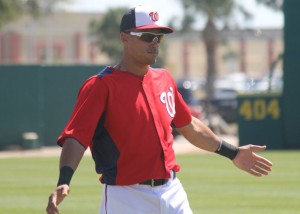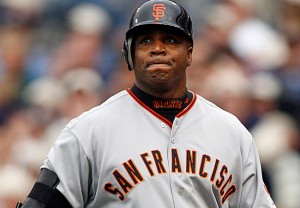Qualifying Offer (QO) extension time has come and past, and a record 20 players received the 15.8M one-year contract tender for 2016.
The Nationals, as has been typical, went the conservative route and only gave a QO to the two players they expect to reach significant, multi-year deals. Jordan Zimmermann and Ian Desmond. They opted not to extend offers to their other 7 free agents, nor to the two guys who a year ago you would have thought to be locks to get one (Doug Fister and Denard Span).
(coincidentally: am I the only one who thinks that the Nats actually have 9 free agents on their end-of-year 40-man roster? Zimmermann, Desmond, Span, Fister, Uggla, McLouth, Janssen, Thornton and Johnson. Why is it that all the other stories I read only list the first 8? Is Reed Johnson actually not a FA? Look at the Nats XLS on Cots‘; Johnson is absolutely listed as a FA, as are 6 others, plus the two with options that we’ve already declined. Am I wrong?)
Anyway. I’m on record as saying that the Nats should have extended 3 QOs to include Span. Yet not for the first time, the team has opted not to offer a QO to a guy who clearly would have declined it. And this will be the third time they have made a crucial mistake as an organization and gave away a high draft pick needlessly. Edwin Jackson was always going to sign a multi-year deal and the Nats inexplicably failed to give him one. Same with Adam LaRoche, who clearly still had a market for his services and would have garnered another pick.
I’m not sure exactly what Scott Boras seems to “have” on the Lerners … but not for the first time they’ve cut him a break and done him and his clients an inexplicable favor. So, what exactly do the Nats get out of this? Span should send the team management a fruit basket for not destroying his FA market this coming off-season. I’ve said it before and I’ll say it again: Span didn’t hire Scott Boras so that he could hand over a commission check on a gift of a $15.8M one year deal. Span was never going to accept that QO. Just dumb. But hey, it isn’t exactly the first dumb thing this front office/ownership group has done this off season…
So, of the 20 players who did get a QO … the annual question remains. Will someone actually take it this year? Just as a reminder, here’s the entire list of QO-offered players since the system began, with their eventual contract offer and a judgement of whether or not the QO “hurt” their next contract. Eight in 2012, 13 in 2013, and 12 after last season. That’s 33 total players and so far NOT ONE has signed the deal. I’m still not entirely convinced that there’s not a Player’s Union-wide conspiracy going on where they decline the QOs en masse because they don’t agree with it for some reason. Certainly it seems like the next CBA will eliminate it, since it has clearly done little except harm the market for FAs.
Here’s a quick opinion on the 20 guys who got QOs and what I think may happen (AAV = Average Annual Value on their contract):
- Easily surpass AAV of $15.8M and get monster deals: Greinke, Heyward, Zimmermann, Upton, Gordon: All of these guys are marquee free agents, are the kind of guys you give up a pick to sign gladly, and will sign for significant money well eclipsing the QO AAV or guaranteeing a significant amount of money (like, in the $80M+ range).
- Will sign multi-year deals with significant money, even if AAV is “only” at or near $15.8M: Desmond, Davis, Iwakuma, Gallardo, Samardzija: I can see Desmond doing 4/$60 or something like that in New York, I can see the two pitchers getting nice deals in the 3/$45 range and I can see Davis banking a short high AAV deal. For me, even Samardzija’s 2015 decline won’t scare off some teams, especially teams out west in pitcher’s parks and especially since he could be a nice 2nd-tier deal of an arm once you get past the significant FA pitchers.
- Might not get $15.8M AAV, but will sign for at least 2/$25M or 3/$40M or something: Lackey, Chen, Kendrick, Weiters, Anderson: Most of these guys probably take less AAV but guarantee more total cash, like several guys did last off-season. I’ll bet some of these guys re-sign with their current teams too (Anderson, maybe Kendrick, maybe Lackey too). The draft pick compensation likely scares off some teams here, so their market will be limited, but if a team has a protected first pick they might be ok giving up a second rounder for these guys. Or, a team like Washington, which will get two supp-1st picks, may be willing to give up its 1st rounder to just “drop down” 10-15 slots to sign these guys.
So that leaves more than a few guys who might be crazy not to sign the offer sheet:
- Rasmus: made just $8M this year; does anyone really think he’s getting significantly more in FA on an AAV basis? Plus, who is going to give up a 1st or even a 2nd round pick to sign him? And he hit just .238 in a hitter’s park. This seems like a “dare” move from the Houston front office, known in the industry to be just a bit too clever for their own good sometimes. As in, “I dare you to break with your union and take this deal.” If there really is some un-spoken agreement among players to never take a QO, he’s a great test case.
- Fowler: Similar situation to Rasmus ($9.5M this year): he’s not the kind of guy you commit significant money to, is he? He does have value in a very small CF market, so perhaps you make the argument he belongs in the same conversation as Lackey or Kendrick.
- Murphy: made just $8M this year and hit half as many homers in the post season as he had all year. So clearly he made himself some cash with his post-season exploits .. but enough to double his pay on an AAV basis? A shrewd move from the NY front office, pressing the issue here with Murphy.
- Kennedy: $9.8M this year but has been awful. Might not even be a 5th starter, and has Scott Boras as an agent. Who’s giving up a 1st rounder to make him their 5th starter? Who’s signing him to a long term deal? Without the QO stigma, I could have seen him signing a 1yr/$8M deal but not much else. How can he possibly not take this offer, a gift of a pillow contract to re-gain some value for next off-season? One reason: his agent. Is Kennedy going to be the next Stephen Drew or Kendrys Morales, who gets talked into hitting the open market by his aggressive agent only to find himself sitting until next year’s draft passes since nobody’s willing to give up a high round pick to sign him?
- Estrada: he made just $3.9M in 2015 and has made just $10m TOTAL in his career, yet got offered $15.8M for next season after a breakout year in Toronto. Uh, why wouldn’t he take this QO? He’s on the wrong side of 30, would more than double his CAREER earnings with one stroke of the pen, and if he repeats his performance could get a 3-year deal taking him past age 35 to lock up his financial future. This is easily the craziest QO we’ve seen yet and will be the biggest test of the system.
It just seems to me that this last group of players are either going to re-sign with their own team or are going to get really screwed in the open market. Look at that last group of 5 players and tell me who’s giving up a 1st round pick to sign them?
Good further reading on the same topic:
- Grant Brisbee‘s analysis of who is getting “hosed” by the QO this year.
- Buster Olney‘s list of seven players who may accept the QO this year
- Ken Rosenthal with an editorial about the state of the QO system.




